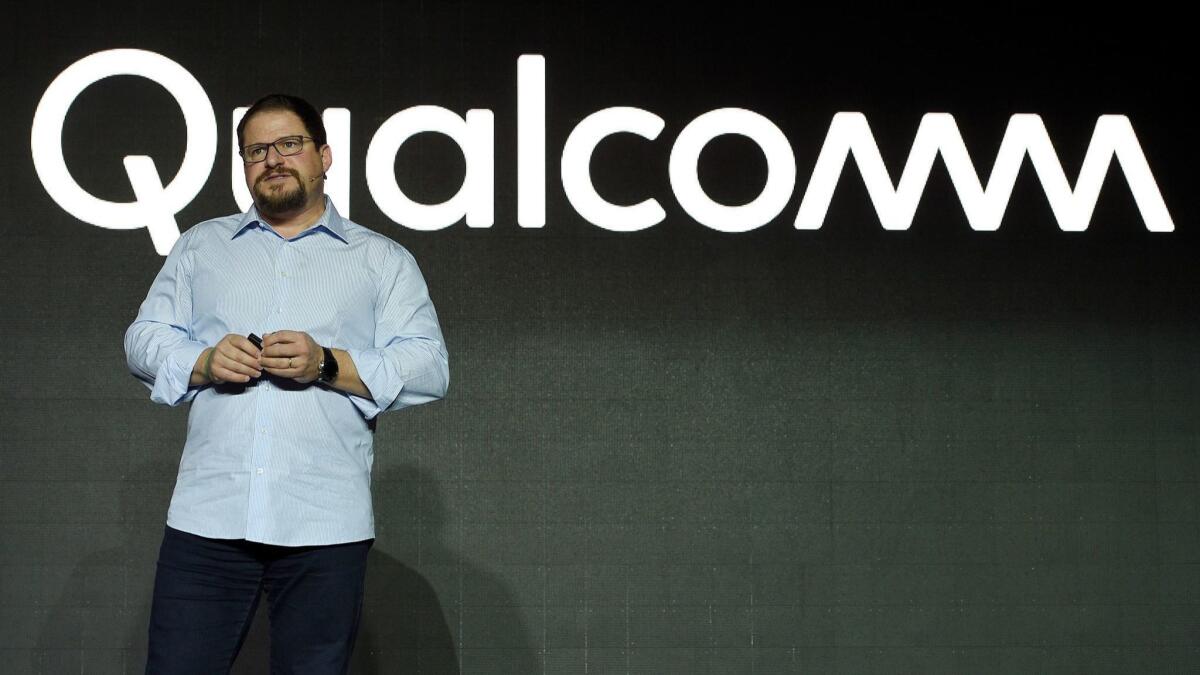Apple and Qualcomm end their legal war over patented tech in iPhones

Apple Inc. and Qualcomm Inc. agreed Tuesday to end a two-year legal war over billions of dollars of technology licensing fees that had threatened to reshape the chipmaker’s most profitable line of business.
Apple will make a one-time payment to Qualcomm, and the two reached a multiyear agreement under which Qualcomm will supply chips and license its technology to Apple in exchange for royalty payments, the companies said in a statement Tuesday.
For the record:
4:30 p.m. April 16, 2019A previous version of this article said Qualcomm’s stock ended the day at $79.45. The stock closed at $70.45.
All the litigation between the companies around the world will be dismissed, they said. They did not disclose any amounts related to the payments or fees.
Qualcomm shares soared 23.2% to $70.45 — their biggest single-day gain since 1999.
A court victory for Apple would have hampered Qualcomm’s ability to collect fees on the technology that powers mobile phones around the world. But Apple had an incentive to settle too. The arrangement helps the iPhone maker keep from falling behind in fifth-generation, or 5G, technologies designed to provide blanket wireless coverage and propel faster and more versatile mobile services.
Apple’s biggest rival, Samsung Electronics Co., already has a phone on the market that will support the new technology based on a Qualcomm chip.
Apple’s current modem supplier, Intel Corp., wasn’t planning to have its 5G chip in phones until next year — about the time Qualcomm expects to have an updated 5G modem available. (Intel late Tuesday said that it plans to exit the 5G smartphone modem business because “it has become apparent that there is no clear path to profitability and positive returns.”)
“There were worries that this was going to be a nasty court battle, and I think that Apple realized ... that it was in their best interest, based on 5G and licensing issues, to settle,” said Dan Ives, an analyst at Wedbush Securities. “Apple and Qualcomm both had more to lose in trial than if they just settled.”
Qualcomm said it expects the agreement to add $2 a share to its earnings when it begins shipments of chips to Apple. Although it’s not clear how much Qualcomm gave up in concessions to Apple in terms of payments and rates, the settlement lets it continue one of the most profitable businesses in the $400-billion semiconductor industry. Apple was the remaining holdout from a licensing practice that enables the San Diego chipmaker to charge patent royalties on technology that underpins all modern smartphones.
Based on that $2-a-share forecast and a rough estimate of how many iPhones might be sold with Qualcomm’s modems, it doesn’t appear that the chipmaker made any major concessions to Apple in terms of the licensing rate per phone, said Kevin Cassidy, an analyst at Stifel Nicolaus & Co.
“It seems like they played chicken and won,” Cassidy said.
The two companies began a federal jury trial Monday in San Diego that was to decide whether Apple owed Qualcomm unpaid royalties or the iPhone maker was right to argue that it was the victim of unfairly inflated charges.
Underlining how bitter the fight had been, the two sides were still taking shots at each other in court as the settlement was announced.
Qualcomm lawyer Evan Chesler was wrapping up his opening statement, telling jurors that Apple had been planning the legal assault on the chipmaker’s business model for years.
“It was all planned in advance, every bit of it,” Chesler said.
He cited an internal Apple document indicating it would be beneficial for the iPhone maker to wait to provoke a patent fight with Qualcomm until after 2016, when the companies’ previous deal would expire.
Apple lawyer Ruffin Cordell told the jury that Qualcomm had broken a commitment to license technology to competing chipmakers, driving them out of the market for modems and using the resulting market dominance to dictate licensing terms to phone manufacturers who had no choice but to agree.
Qualcomm shares had underperformed this year until Tuesday’s surge. Apple shares were little changed at $199.25. Representatives of Apple and Qualcomm declined to comment beyond the companies’ statement.
Qualcomm may give more financial details May 1, when it is scheduled to report quarterly earnings.
The company’s licensing business generated $5.16 billion in the 2018 fiscal year, down 35% from before Apple began withholding its payments. The unit produced 23% of Qualcomm’s total revenue and 54% of its profit in the fiscal year.
Qualcomm is still waiting for a federal judge’s ruling on claims by the U.S. Federal Trade Commission that the company’s licensing practices are anti-competitive. The regulator accused Qualcomm in a 2017 lawsuit of using its dominance in the smartphone technology market to thwart competitors’ growth and force companies including Apple and Huawei Technologies Co. to pay inflated patent royalties. A nonjury trial in San Jose was held in January.
Separately, Qualcomm faces a class action on behalf of as many as 250 million consumers seeking as much as $5 billion in damages over claims that they suffered from inflated retail prices. The company has said it’s probably the largest class action in history and is asking an appeals court to block the consumers from proceeding as a group.
More to Read
Inside the business of entertainment
The Wide Shot brings you news, analysis and insights on everything from streaming wars to production — and what it all means for the future.
You may occasionally receive promotional content from the Los Angeles Times.










